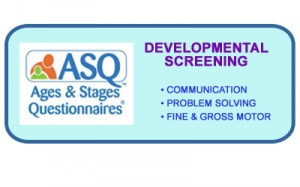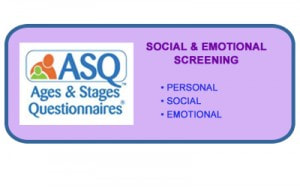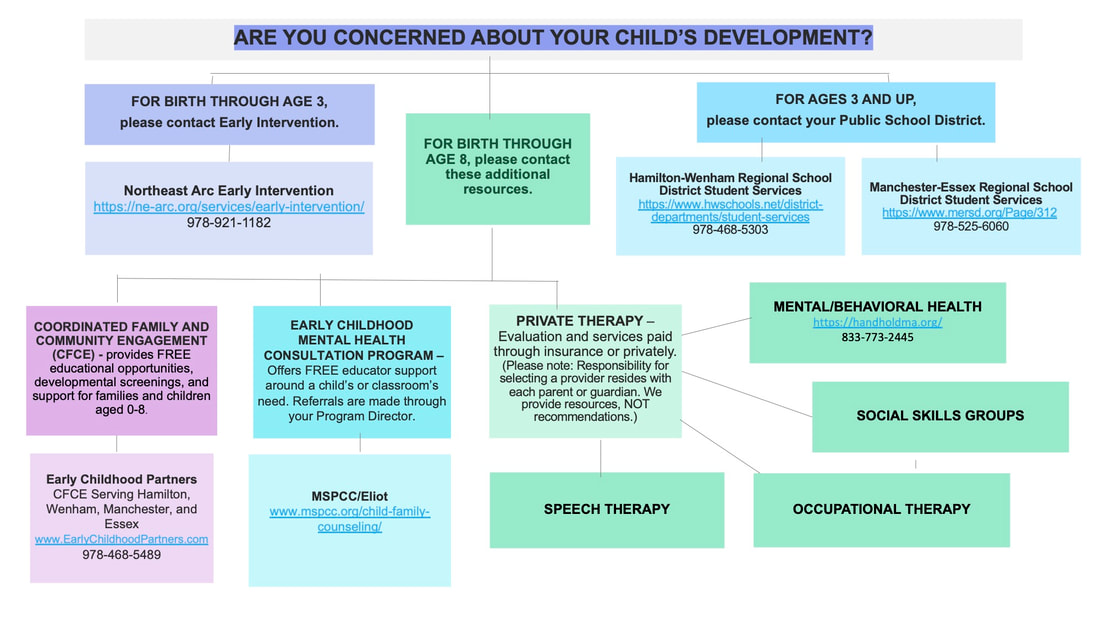AGES AND STAGES QUESTIONNAIRES (ASQ)
Skills such as taking a first step, smiling for the first time, and waving “bye-bye” are called developmental milestones. Children reach milestones in how they play, learn, speak, behave, and move. Children develop at their own pace, so it’s impossible to tell exactly when a child will learn a given skill. However, the developmental milestones give us a general idea of what to expect as a child gets older.
The Ages & Stages Questionnaire (ASQ) is the easiest and most accurate way to pinpoint delays and celebrate milestones for children between one month and 5½ years. The ASQ is a ten to fifteen minute long parent-completed developmental screening. It contains a series of questions designed for your child's specific age group. After you answer the questions, we score the ASQ and share the results with you. The scoring is broken into three categories - 1.) the child’s development is on schedule, 2.) provide learning activities and monitor, or 3.) further assessment with a professional may be needed.
Early Childhood Partners CFCE is currently offering the ASQ online AND at no cost to our families!
Please contact us for more information OR click on the links below to get started!
The Ages & Stages Questionnaire (ASQ) is the easiest and most accurate way to pinpoint delays and celebrate milestones for children between one month and 5½ years. The ASQ is a ten to fifteen minute long parent-completed developmental screening. It contains a series of questions designed for your child's specific age group. After you answer the questions, we score the ASQ and share the results with you. The scoring is broken into three categories - 1.) the child’s development is on schedule, 2.) provide learning activities and monitor, or 3.) further assessment with a professional may be needed.
Early Childhood Partners CFCE is currently offering the ASQ online AND at no cost to our families!
Please contact us for more information OR click on the links below to get started!
|
The ASQ-3 (GENERAL DEVELOPMENT) screens across several key domains: communication (both what your child understands and what they say), gross motor skills (your child's large muscle movement used for rolling, sitting, crawling, walking, running, and more), fine motor skills (hand and finger movement and coordination), problem solving (how they play with toys and solve problems), and personal-social development (your child's self-help skills and how they interact with others).
To complete the ASQ-3, please follow this link: ASQ-3 |
The ASQSE-2 (SOCIAL EMOTIONAL DEVELOPMENT) screens seven key behavioral areas: self-regulation (your child's ability to control emotions and impulses), compliance (degree to which your child does what you ask them to do), social-communication (verbal and non verbal social interaction), adaptive functioning (age appropriate life skills), autonomy (control over themselves and their choices), affect (ability to recognize and express a range of emotions), and interaction with people.
To complete the ASQSE-2, please follow this link: ASQSE-2 |
Resources for Parents and Caregivers
ASQ Quick Guide
FOR PARENTS- AGES AND STAGES QUICK GUIDE
How Parents of Infants Can Support Social-Emotional Development
How Parents of Toddlers Can Support Social-Emotional Development
Basic Insights Tips To Boost Your Child's Development
ASQ Quick Guide
FOR PARENTS- AGES AND STAGES QUICK GUIDE
How Parents of Infants Can Support Social-Emotional Development
How Parents of Toddlers Can Support Social-Emotional Development
Basic Insights Tips To Boost Your Child's Development
Early Childhood Partners programs are funded by the Coordinated Family & Community Engagement (CFCE) grant awarded to Hamilton-Wenham Regional School District by the Massachusetts Department of Early Education and Care. The HWRSD does not discriminate in its programs, activities or employment practices on the basis of race*, color, sex, sexual orientation, gender identity, religion, disability, age, genetic information, active military/veteran status, marital status, familial status, pregnancy, or pregnancy-related condition, homelessness, ancestry, ethnic background, national origin, or any other category protected by state or federal law.




